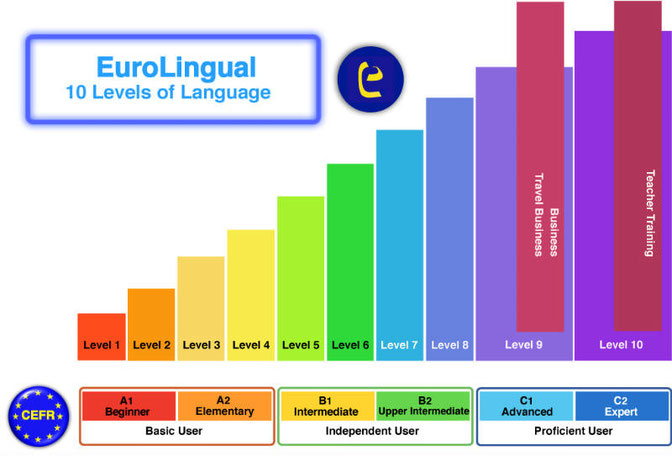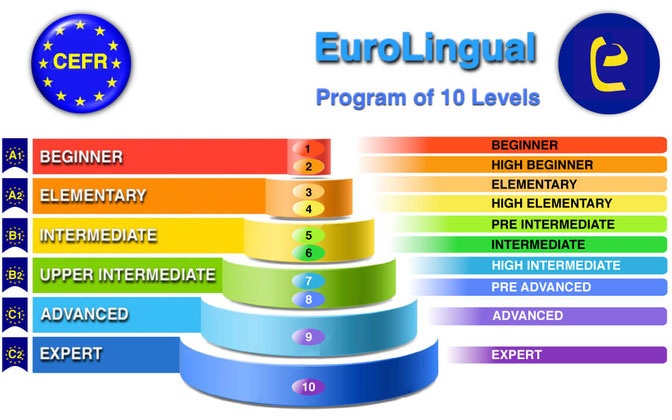EuroLingual has 10 Levels of Teaching Method
|EuroLingual School
EuroLingual LANGUAGE LEVELS

The courses of EuroLingual are organized into 10 different levels adapted to students’ knowledge. They are structured in accordance with the CEFR (Common European Framework of Reference for Languages). Level 1 is aimed at absolute beginners and level 10 is for students with a level of proficiency close to that of a native speaker. Level 8 closes with all the knowledgement of grammar, the following two levels are for improving the language.
In order to ensure students are correctly placed in classes corresponding not only to their knowledge, each student takes a placement lesson involving especially in spoken evaluation.
EuroLingual 10-Level Language Chart:
Only one meets your needs!
Click on picture to zoom in

A1: Beginner or Breakthrough

(Beginner)
You are a complete beginner and have no prior or very little practical ability in using the language, with the exception of perhaps a few key words or sentences (exchange greetings, give your identity and name a few familiar objects of your environment). Using gestures, pictures, CD's and DVD's you will develop speaking/pronunciation skills and basic vocabulary, grammar and survival language.

(High Beginner)
You are a “false beginner” or "advance beginner" – i.e. you have a foundation but very basic knowledge of the language, with a limited vocabulary. You had some exposure to the language. You have no real understanding of the grammar and can produce no more than a few key words and memorized phrases. Maybe you haven’t used the language in a while, or simply want to start at ‘the beginning’.
E.g. you can introduce yourself, ask simple directions and order food & drink in a café or restaurant.
At the end of Beginner (A1):
- You can understand and use familiar everyday expressions and basic phrases aimed at the satisfaction of needs of a concrete type.
- You can introduce yourself and others.
- You can ask and answer questions about personal details such as where you live, what you do, people you know and things you have.
- You can ask and give directions.
- You can order food & drink.
- You can make very basic travel and accommodation arrangements.
- You can have a basic conversation, provided the other person talks slowly and clearly and is prepared to help.

A2: Elementary or Waystage

(Elementary)
You can understand and use familiar everyday expressions and basic phrases, but your ability to communicate is limited and you find it difficult to understand everyday spoken language. You can use and understand simple sentence structures and have come across different grammatical structures, but are not confident in applying them correctly/consistently.

(High Elementary)
You can produce sentences and formulate, and respond to, everyday questions. You have a basic knowledge of grammatical structures, including different tenses and word order, and have enough vocabulary to 'get by' in predictable situations.
At the end of Elementary (A2):
- You can understand sentences and frequently used expressions related to areas including basic personal and family information, shopping, local geography and employment.
- You can communicate in simple and routine tasks, requiring a simple and direct exchange of information on familiar and routine matters.
- You can describe, in simple terms, aspects of your background, immediate environment and matters in areas of immediate need.
- You can comfortably ‘get by’ when visiting the country, albeit with some difficulty.

B1: Intermediate or Threshold

(Pre Intermediate)
You can use and understand simple structures fairly consistently, and can respond to a wide range of questions on familiar subjects. You have a reasonable idea of how the verb system works (present, past and future) and an active vocabulary of around 700 words. You can express yourself in familiar contexts, albeit with quite a few mistakes still.

(Intermediate)
You can communicate effectively, if not always accurately, in most everyday situations and could consider working in the country using the language (e.g. bar/counter work, service in cafés, basic office work). You can distinguish the differences among the past tenses and the use of conditional and you are able to narrate in the past.
At the end of Intermediate (B1):
- You can understand the main points of clear standard input on familiar matters regularly encountered in work, school, leisure, etc.
- You can deal with most situations likely to arise whilst travelling in an area where the language is spoken.
- You can produce simple connected text on topics, which are familiar, or of personal interest.
- You can describe experiences and events.
- You can talk about dreams, hopes and ambitions.
- You can briefly give reasons and explanations for opinions and plans.
- You could consider working in the country using the language (e.g. bar/counter work, waiting service in cafés or basic office work).

B2: Upper Intermediate or Vantage

(High Intermediate)
You can understand the main points of clear standard input on familiar matters regularly encountered in work, school, leisure, etc. You can deal with most situations likely to arise whilst travelling in an area where the language is spoken. You can produce simple connected text on topics which are familiar or of personal interest. You can describe experiences and events, dreams, hopes and ambitions, and briefly give reasons and explanations for opinions and plans.

(Pre Advanced)
Good vocabulary and a fair understanding of fundamental grammatical rules and how to apply them. Reasonably confident speaking in most common, social or work settings and developing fluency in your reading and writing. You want to use the language more flexibly and use appropriate register to suit the context. You also want to understand some of the more complex grammar forms.
At the end of Upper Intermediate (B2):
- You can understand the main ideas of complex text on both concrete and abstract topics, including technical discussions in your field of specialization.
- You can interact with a degree of fluency and spontaneity that makes regular interaction with native speakers quite possible, without strain for either party.
- You can produce clear, detailed text on a wide range of subjects and explain a viewpoint on a topical issue, giving the advantages and disadvantages of various options.
- You can do business with speakers of the language in most run-of-the-mill situations.
- Grammar is already well mastered, and so is only revised selectively. Now the focus is on the finer points of the language.

C1: Advanced or Effective Operational Proficiency

(Advanced)
You can understand the main ideas in details on a variety of complex topics such as news, stories, explanations and instructions, including technical discussions in your field of specialization. You can speak with a degree of fluency with native speakers in a clear way, without strain for either party. You can write clear, detailed text on a wide range of subjects (formal and informal letters, descriptions and summaries of professional topics, research papers, etc.) and explain a viewpoint on a topical issue, giving the advantages and disadvantages of various options.
At the end of Advanced (C1):
- You can understand a wide range of demanding, longer texts, and recognize implicit meaning.
- You can express yourself fluently and spontaneously without much obvious searching for expressions.
- You can use the language flexibly and effectively for social, academic and professional purposes.
- You can produce clear, well-structured, detailed text on complex subjects, showing controlled use of organizational patterns, logical flow of text, and clear awareness of the audience.

C2: Expert Mastery or Proficiency

(Expert)
You are native or almost native speaker. The purpose of this level is to continue raising the language level and cultural competence so that you can succeed in credit courses or work in jobs requiring native-like language skills.
You are able to use language skillfully, with accuracy efficiency and effectiveness. You can understand a wide variety of styles of speech on highly specialized topics (classical theater, films, professional lectures, public and academic debates, literary readings and jokes and puns). You can write formal tasks, journal articles, professional and academic issues, etc.
At the end of Expert (C2):
- You can understand with ease virtually everything heard or read.
- You can summarize information from different spoken and written sources.
- You can reconstruct arguments and accounts in a coherent presentation.
- You can express yourself spontaneously, very fluently and precisely.


